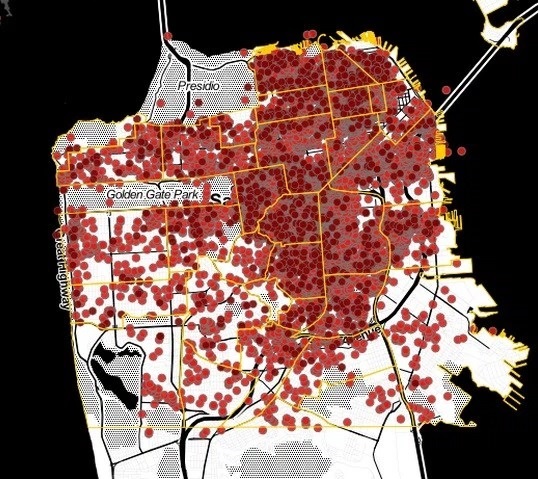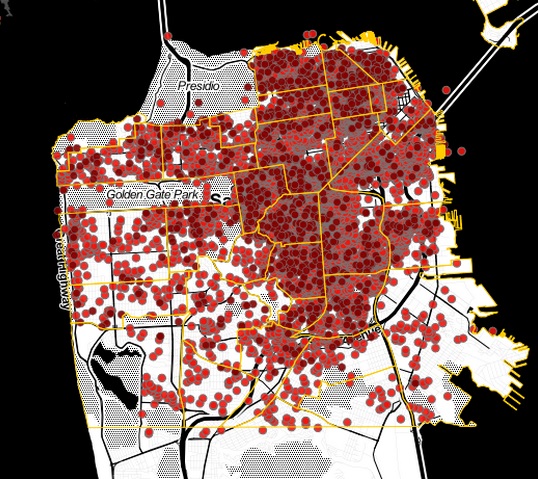
Did anyone catch the not-at-all-veiled threat in the Chronicle story on new efforts to limit Airbnb rentals?

The measure, sponsored by Sups. London Breed and Aaron Peskin, would cap all rentals at 60 days. Breed voted against similar caps when the original legislation passed; in fact, she was the sixth vote to allow Airbnb to do business legally in SF under very lax rules with no effective enforcement. That law has probably cost a few thousand renters their homes – it’s encouraged landlords to evict all their tenants and turn entire buildings into hotel rooms. Then she voted to make the law even worse.
Now Breed, facing a tough challenge from tenant advocate Dean Preston (who has long been a critic of the weak Airbnb law) has apparently realized that the law she helped pass has been an abject failure and has harmed tenants and jacked up rents in her district.
So she’s joining Peskin, a leader in the move to regulate short-term rentals, in a modest measure that might give Airbnb a message: You want to mess with the city – that is, sue over reasonable regs – and we might make the rules even tighter. Not quite what I would have suggested, but still: way better.
Here’s what Nathan Ballard, a political consultant, had to say:
“By aggressively going after Airbnb, she is making some very powerful enemies. Airbnb plays to win. Their political strategy is overseen by the brilliant political operative Chris Lehane, whose powerful and potent legal strategy killed Airbnb’s opposition the last time it reared its head” with Prop. F.
(UPDATED TO CORRECT BALLARD’S ROLE)
It’s time that the city stops running away from these “powerful enemies.” If San Francisco can’t reign in Airbnb, it’s hard to imagine what city ever could.
A couple of points to think about.
You have to give Preston tremendous credit here: He did the thankless and difficult job of taking on an incumbent, pursuing a progressive campaign against someone who is far more moderate than her district. And we already see the results. If Breed were unopposed, I don’t think she’d be pushing this bill.
So let’s play it out. The mayor, who has no friends left at all except Conway and the Big Tech crew, will almost certainly veto any anti-Airbnb bill that has fewer than eight votes.
Sup. Scott Wiener has strong support from the Conway gang. He’s in a tight state Senate race – and if he votes against this bill, it will give Kim a big boost.
Breed is with Wiener, not Kim.
It’s less than a month before the election. There’s a 30-day waiting period after any measure in introduced before it goes to committee. Breed could waive that – and in the process put her ally Wiener in a very difficult place.
So you think this bill will make it to the Board of Supes, after going through committee, before Nov 8? If it does, and the mayor vetoes it, you think that the veto override might take place before the new board is in place?
If the progressives don’t win all six seats in November, you think there’s any chance of a veto override?
Big Tech knows what’s going on here – Airbnb’s allies are pouring vast sums of money into the contested supes races, trying to make sure that any bill like this won’t survive the next board.
And wouldn’t it be nice if San Francisco had a mayor who would read Ballard’s comments and say: We aren’t afraid of you. Don’t mess with San Francisco.
Alas.
Wayne Friday, the longtime political columnist for the B.A.R, died last week. He was part of the Harvey Milk generation, and he and Milk were friends. He helped get Milk elected to the Board of Supes, and according to this historically fascinating obit, took over Milk’s political column after the historic election.
By the 1980s, he was moving to the more moderate side of things, becoming friends with Dianne Feinstein and Scott Wiener. He was not a terribly progressive member of the Police Commission.
But he was always friendly and respectful to me and the Bay Guardian, and we all read his column. And how was your week?
The Police Commission isn’t discussing the next chief this week, which suggests that the panel has already sent its three choices to the mayor. Reports are that Acting Chief Toney Chaplin is among the finalists.
The mayor’s not on the ballot, but his policies are – and if he’s going to appoint Toney, he’s going to do it after the election. Which is hardly a vote of confidence.
Meanwhile, the Government Audit and Oversight Committee holds a hearing Thursday/20 on a Civil Grand Jury report on transparency in the investigation of police shootings. The committee will hear from all parties, and everyone will agree we need to do better. And then we will be up against the Peace Officers Bill of Rights, the horrible state law that bans any serious transparency in any police discipline.
That ought to be an issue in the state Senate race.



play land: the glaring truth for all of us remains that Airbnb has never been cooperative, transparent or a good corporate citizen in San Francisco or any other city in the world. Long ago, Airbnb made the calculation that they would make as much money as fast as they could before laws could catch up with them. That is exactly what they have been doing all along. Airbnb is accountable to no one. Your argument is flawed. Airbnb has consistently tried to make it impossible to collect or track data, but thoughtful people are painstakingly assembling that data. It is striking that Airbnb & its officers have been so unwilling to abide by the standards and rules that all others must follow. And the worm is turning.
And on It goes……. the beginning of the end of business as usual for Airbnb.
From the NYTimes article:
“It’s a tacit acknowledgment of what we’ve been saying all along — that Airbnb is dominated by commercial operators with multiple listings who are stealing our supply of affordable housing,” said Neal Kwatra, the chief strategist for Share Better, a coalition of elected officials, affordable housing activists, community groups and unions aligned against Airbnb.
Mr. Kwatra added that Airbnb’s proposal was “nothing more than the same failed P.R. stunt Airbnb has tried in every city that seeks to strengthen regulations to stem the tide of their exacerbation of the affordable housing crisis.”
New York City is Airbnb’s largest market in the United States. Hosts in the city generated about $1 billion in revenue, and a portion of that goes to the company.”
The reckoning……..
http://mobile.nytimes.com/2016/10/20/technology/airbnb-proposes-cracking-down-on-new-york-city-hosts.html?referer=
Anytime you read something data related and you only see percentages (as opposed to absolute amounts) you can safely assume that you are reading something misleading.
@debutante69:disqus presents a whole bunch of scary percentages, but the report, on page 3 ( http://sfbos.org/sites/default/files/FileCenter/Documents/52601-BLA.ShortTermRentals.051315.pdf ) says that their primary, best estimate of total units involved is 1,251. Which, since we like to use percentages, is 0.51% of the rental stock.
And not all of the 1,251 would be rented if Airbnb went away. In some cases people are renting out the spaces where their grandkids come for the holidays. Others just don’t want a full time tennant.
Yes, the way to make 1,251 seem like a huge problem is to divide it by the available units in a really hot market. I’m not saying that 1,251 is completely insignicant, I’m just saying that this article and comments are examples of how people push misleading statements.
In May of 2015, The San Francisco Budget Analyst’s office released an independent study that provided an analysis of the impact of short term rentals by comparing longer-term hosts and evictions. The analysis showed that up to 23.2% of total citywide vacant units units have been removed from the housing market. As usual, Airbnb refused to provide any information. The data was compiled through online research in a data scrape. In the Haight between 32% and 43% of the vacant rental housing units were listed on Airbnb. In the Mission between 29-40% of potential rentals were listed on Airbnb.Airbnb consistently refuses to utilize a central registry where all units must be registered. http://www.sfexaminer.com/airbnb-rentals-cut-deep-into-sf-housing-stock-report-says/
>”That law has probably cost a few thousand renters their homes”
Curious how you get to that conclusion. Every estimate of units that are being rented out for more than 90 days puts the figure between mid hundreds and 2,000. And it has not gone up since the law that you blame was created.
So are you saying that EVERY unit rented for more than 90 days represents an evicted renter? And then there are another 50% beyond the worst case estimates? Do you have ANY facts that substantiate your claim? How do you get to 3,000?????
Flight, I think you may mean “lack of interest,” not “disinterest”. The latter term means fairness or a lack of bias. You mean to criticize Breed, right? But her disinterest would be to her credit.
Breed has indeed changed her tune – temporarily.
At the first D5 supervisor debate, Breed showed utter disinterest in reigning in Airbnb. She stated she did not care about the “millions” Airbnb was making.